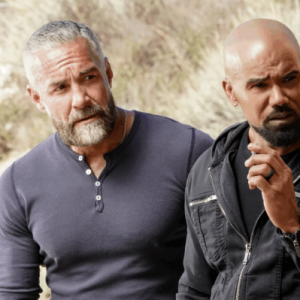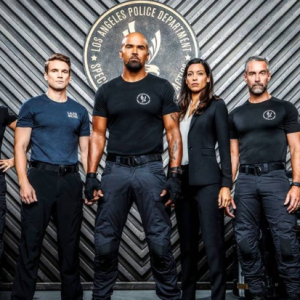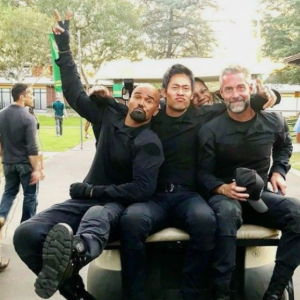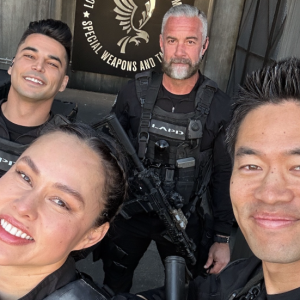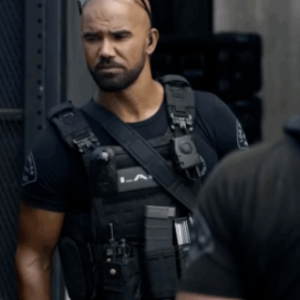The landscape of network television is constantly shifting, marked by strategic casting decisions and the pursuit of fresh narratives. One such significant development recently sent ripples through the fan bases of two distinct yet equally compelling franchises: the high-octane action procedural S.W.A.T. and the eagerly anticipated Dr. Watson series. A beloved, long-standing star from the CBS hit, known for their integral role within Hondo’s elite squad, is officially departing the streets of Los Angeles to embark on a thrilling new journey in the realm of mystery and deduction. This move, while undeniably exciting for the actor and the nascent Dr. Watson project, has evoked a bittersweet reaction from fans, who now contemplate a noticeable void in S.W.A.T.’s formidable lineup.
This high-profile transition signifies more than just an actor changing roles; it represents a calculated evolution for a seasoned performer, a strategic gain for a new series, and a test of resilience for an established favorite. The departure forces S.W.A.T. to adapt its well-oiled team dynamic, while simultaneously injecting Dr. Watson with immediate star power and a built-in audience. Understanding the implications for the show, the actor, and the innovative reimagining of the Dr. Watson legacy requires a deeper dive into the complexities of this casting shake-up.
For years, the departing star has been an undeniable cornerstone of the S.W.A.T. team. Their presence helped anchor the delicate balance between the show’s signature tactical action and its deeply personal, character-driven drama. This actor consistently delivered performances imbued with heart, grit, and a layered complexity that resonated with viewers. They were not merely a component of the squad but a vital emotional and strategic linchpin, contributing significantly to the team’s cohesion and problem-solving capabilities. While CBS has historically demonstrated a willingness to recast or shift characters throughout its programming, this particular exit carries a profound weight, prompting speculation about how the series will address such a significant absence. Though an official farewell storyline has yet to be disclosed by the network, it is widely expected that the character’s departure will be thoughtfully woven into the fabric of the upcoming season, honoring their journey and contribution to the team rather than resorting to an abrupt or unceremonious exit. Common television tropes suggest possibilities ranging from a promotion to another S.W.A.T. unit, a transfer to an allied agency, or perhaps a deeply personal arc that necessitates a move away from the high-stakes demands of urban policing.

The move from an intense, action-oriented procedural to a mystery-driven series centered on cerebral deduction might initially appear to be a drastic leap. However, upon closer examination, it emerges as a remarkably astute and synergistic career progression for the actor. Their proven versatility is a key factor. Having consistently showcased the ability to deliver performances rich in emotional depth, physical prowess, and nuanced characterization within S.W.A.T., the actor is exceptionally well-equipped to tackle the demands of a new genre. This extensive range, honed over years of portraying a character caught between explosive action and profound personal challenges, makes them an ideal candidate for a role requiring both intellectual gravitas and compelling character work.
Furthermore, the Dr. Watson series stands to gain immensely from this acquisition. Launching a new franchise, especially one reinterpreting an iconic literary figure, inherently requires recognizable faces to capture immediate audience attention and build credibility. Bringing aboard a star from a highly successful and critically acclaimed series like S.W.A.T. provides an instant boost, signaling to potential viewers that this new venture is serious about its talent and narrative quality. The actor’s established fan base, loyal and engaged through their tenure on S.W.A.T., is a valuable asset, likely to follow their favorite performer into this fresh narrative landscape, thereby contributing significantly to Dr. Watson’s initial viewership numbers and overall buzz.
From the actor’s perspective, this transition represents a fresh and invigorating professional opportunity. After years immersed in the uniform and rigorous physical demands of a tactical unit, shifting to a more cerebral and character-focused role offers a chance to profoundly stretch their acting range. It allows for exploration of different facets of performance, delving into the intricacies of psychological drama, deductive reasoning, and complex interpersonal dynamics that may have been less central to their previous role. Such a move is often a strategic career choice for actors seeking to avoid typecasting and demonstrate a broader repertoire of skills.
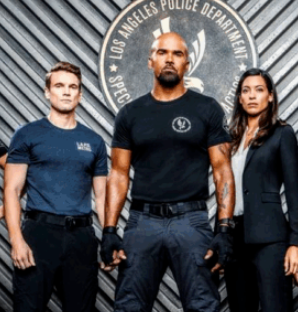
The new Dr. Watson series promises a modern reimagining of the legendary companion to Sherlock Holmes. Crucially, this version shifts the narrative spotlight, centering on Dr. Watson’s inherent brilliance, unwavering resilience, and strong moral compass, rather than existing solely in Holmes’ shadow. Early reports indicate a tone that will skillfully blend intricate crime-solving with deeply character-driven drama, offering a rich tapestry for storytelling. The role of the S.W.A.T. star within this new framework is a subject of much speculation. They could potentially portray a formidable rival investigator, an indispensable ally who brings a different skillset to Watson’s world, or even a complex, morally ambiguous antagonist, challenging Watson’s principles and deductive abilities. The series is reportedly aiming for a streaming debut, a strategic choice that enhances its global accessibility and potentially allows for a more mature and nuanced narrative unconstrained by traditional network broadcast standards.
The impact on S.W.A.T. will be profound. Every member of Hondo’s squad contributes a unique skillset, personality, and emotional dynamic. The departure of such a familiar and central figure will inevitably shake up the team’s chemistry and operational rhythm. CBS is expected to respond strategically: introducing a new recruit to fill the tactical void left by the departing member is a likely scenario, allowing for fresh dynamics and new storylines. Concurrently, the network will probably lean more heavily on the remaining cast members, exploring deeper character arcs and allowing existing personalities to step into new leadership or support roles. Shemar Moore’s Hondo, as the unwavering anchor of the squad, will undoubtedly be called upon to shoulder even greater leadership responsibility, ensuring the team’s spirit and mission remain intact despite the loss. This period of transition can often lead to unexpected growth for a long-running series, forcing creative teams to innovate and refresh established formulas.
Fan reactions across social media platforms were immediate and intense upon the news breaking. A significant portion of the S.W.A.T. loyalists expressed genuine heartbreak and sadness at the prospect of losing a staple of their beloved lineup, a character they had invested years in watching evolve. However, an equally vocal segment cheered the actor for bravely taking on a fresh and challenging endeavor, recognizing the professional growth inherent in such a move. Hashtags such as SWATForever and TeamWatson quickly trended, illustrating the powerful crossover fan energy generated by this news. It’s a testament to the deep connection viewers form with characters and actors, creating a phenomenon where loyalty extends beyond a single series. Just as many dedicated NCIS fans eagerly followed Michael Weatherly into his next venture with Bull, it is highly anticipated that a substantial portion of the S.W.A.T. fan base will transition to Dr. Watson, providing a critical launchpad for the new series.
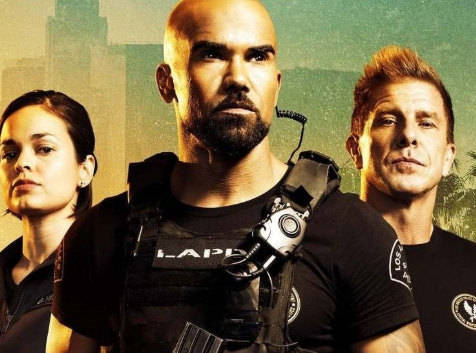
The prospect of the actor potentially returning to S.W.A.T. in the future, even for a guest appearance, should never be entirely dismissed. In the ever-evolving landscape of television, such comebacks are not uncommon, especially when fan demand is high and story arcs allow for it. Networks often prefer open-ended exits that preserve the possibility of a character’s return, treating it more as a “semi-retirement” than a permanent goodbye. Such an arrangement offers flexibility for both the actor and the network, acknowledging the transient nature of long-term commitments while keeping the door ajar for beloved characters to revisit their roots.
Ultimately, this casting shake-up transcends the individual actor; it carries broader implications for both franchises involved. For S.W.A.T., it serves as a powerful demonstration of the show’s capacity to evolve and adapt under pressure, navigating significant cast changes while maintaining its core identity and narrative drive. For Dr. Watson, it represents an immediate and substantial boost, securing a seasoned television star with a proven track record and an undeniable audience pull, thereby enhancing its prospects for a successful launch and sustained viewership. While the transition may feel bittersweet to many, marking the end of one chapter, it undoubtedly signals a win-win scenario in the dynamic world of television, paving the way for new storytelling opportunities and continued artistic growth for all parties.
As Dr. Watson prepares to bring a fresh perspective on mystery back to the screens, fans can find solace in the knowledge that their favorite star will continue to grace their screens—albeit trading the tactical gear of Los Angeles’ elite for the sharp, deductive mind required in the world of Baker Street’s most brilliant companion. This journey from the kinetic energy of a S.W.A.T. operation to the intricate puzzles of a modernized Sherlockian universe promises an exciting and transformative experience, affirming the actor’s versatility and the ever-present allure of compelling storytelling.
